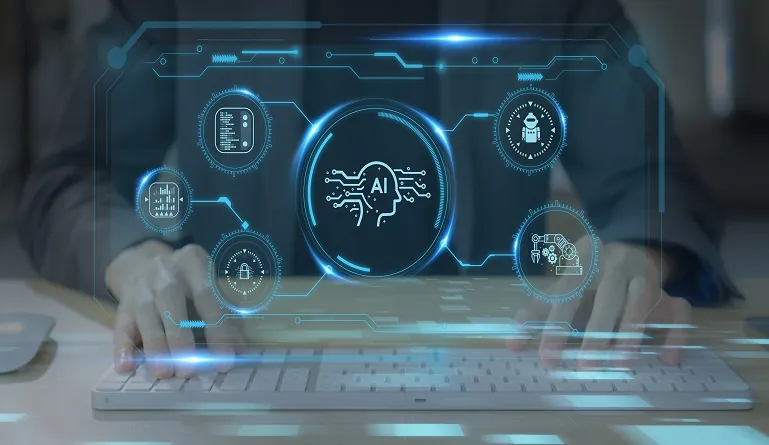From healthcare to finance, retail to manufacturing, AI-powered solutions are revolutionizing the way businesses operate.
Today – and especially since ChatGPT went public in 2022 – artificial intelligence (AI) is no longer a futuristic concept relegated to science fiction. It’s a transformative force reshaping industries across the globe. AI-powered solutions are revolutionizing how businesses operate, from healthcare to finance, retail to manufacturing.
Companies, leaders, and policy-makers aware of this shift have the real opportunity to drive unbridled efficiency, innovation, and growth. In this article, we’ll explore the latest trends in artificial intelligence, their profound impact on various sectors, and what the future might hold. Let’s dive right in.
Latest Trends in Artificial Intelligence: New Intersections and Bold Frontiers
At a very basic level, AI refers to developing computer systems capable of performing tasks that typically require human intelligence. These tasks encompass various activities – such as learning, reasoning, problem-solving, perception, and language understanding.
AI has witnessed unprecedented growth and innovation in recent years, fueled by advances in machine learning, deep learning, and neural networks. In many ways, this made AI Gartner’s most frequently deployed technology in organizations in 2024.
Machine learning algorithms enable AI systems to learn from data, identify patterns, and make predictions or decisions without you explicitly programming them.
Deep learning, a subset of ML, employs artificial neural networks with multiple layers to extract high-level features from raw data. This makes achieving remarkable accuracy in tasks like image recognition and natural language understanding possible.
Neural networks mimic the structure and function of the human brain, enabling AI systems to perform complex tasks with human-like intelligence. Moreover, AI advancements in natural language processing (NLP), computer vision, and predictive analytics drive significant transformations across industries.
NLP enables machines to understand, interpret, and generate human language. This is crucial for real-world applications such as virtual assistants, sentiment analysis, and language translation beyond mere theoretical study. Computer vision empowers AI systems to analyze and interpret visual data, revolutionizing fields like autonomous vehicles, surveillance, and medical imaging.
Integrating AI in big data and the Internet of Things (IoT) represents another major trend in artificial intelligence – enabling smarter, more efficient systems.
Big data analytics leverages AI to extract insights from vast datasets, uncovering hidden patterns, trends, and correlations that human analysts may overlook. IoT devices, equipped with sensors and connectivity, generate immense volumes of data that AI algorithms can analyze in real time, enabling proactive decision-making and automation in smart cities, healthcare monitoring, and industrial operations.
Some of these notable industry-wide trends in artificial intelligence are discussed below.
-
Personalization and Precision in Healthcare
AI revolutionizes healthcare by enabling personalized diagnostics, treatment planning, and patient care management.
These algorithms can analyze medical data—including electronic health records, genomic data, and medical imaging—to assist clinicians in diagnosis and treatment decisions. AI can reduce the chances of incorrect diagnoses and lend a much-needed helping hand to your typically overworked healthcare provider.
In addition to augmenting human efforts, AI is also breaking new ground in healthcare. Innovations like personalized medicine can tailor treatments to individual patients based on their genetic makeup, medical history, and lifestyle factors. This improves treatment outcomes and reduces adverse reactions.
Meanwhile, robotic surgery systems powered by AI enhance surgical precision and efficiency, reducing surgical errors and recovery times. As you can see, existing healthcare technology systems—which have also advanced in leaps and bounds in recent years—get another leg-up from recent trends in artificial intelligence.
-
Lightning Fast, Incredibly Accurate Decision Making in Finance
AI is transforming nearly every process in the finance industry with its speed, accuracy, and predictive capabilities. This is because banking, financial services, and insurance (BFSI) is a traditionally data-intensive sector with ample opportunities for AI intervention.
AI algorithms can analyze financial data, market trends, and risk factors to assess creditworthiness, detect fraudulent activities, and optimize investment portfolios. Similarly, automated trading systems execute trades at lightning speed based on AI-driven algorithms, – leveraging data analytics and machine learning to identify profitable opportunities and mitigate risks.
Trends in artificial intelligence also make life easier for banking customers. AI-powered chatbots and virtual assistants now provide personalized and easily accessible banking services. This extends to customer support, financial advice, and account management on demand.
-
Great CX Meets Heightened Operational Efficiency in Retail
Trends in artificial intelligence can be felt across every stage of the retail value chain. At the bottom of the funnel, retailers harness AI to deliver exceptional customer experiences while optimizing operational efficiency.
In procurement and logistics, you have AI applications in inventory management using predictive analytics. This helps forecast demand, optimize stocking levels, and reduce stockouts and overstocking. Predictive analytics can also forecast consumer behavior with startling accuracy. It allows retailers to optimize pricing strategies and streamline supply chain operations – ultimately enhancing profitability and customer satisfaction.
Thanks to tech giants like Amazon and Netflix, we also witness the rise of personalized shopping experiences that leverage AI algorithms. Your systems can analyze customer preferences, browsing behaviors, and purchase histories in near real-time, enabling retailers to recommend products and promotions tailored to individual shoppers.
-
Intelligent Machines Transform Manufacturing Processes
In the manufacturing sector, AI is setting new benchmarks in productivity and efficiency. AI-powered robots and cobots (collaborative robots) perform repetitive tasks with precision and consistency. The result is a substantial increase in production output while reducing labor costs.
At the same time, quality control systems equipped with computer vision and machine learning algorithms detect defects and anomalies that your human eye might miss – ensuring product quality and minimizing waste.
As trends in artificial intelligence coincide with wider IoT adoption, we’re also seeing the adoption of cyber-physical solutions in manufacturing. For example, predictive maintenance systems can analyze sensor data from IoT-enabled equipment to proactively anticipate equipment failures and schedule maintenance. This allows you to reduce downtime and maximize the shelf-life of equipment.
New Trends in Artificial Intelligence Also Bring New Ethical Challenges
While AI holds immense promise for innovation and progress, it also presents ethical challenges and concerns that must be addressed.
At the micro or granular level, privacy issues arise from AI systems’ collection and use of vast amounts of personal data, raising questions about consent, transparency, and data protection. At the macro level, job displacement due to automation threatens livelihoods and exacerbates socioeconomic inequalities, underscoring the need for reskilling and job retraining initiatives.
Ethical considerations also surround the transparency and accountability of AI decision-making processes, particularly in critical domains such as healthcare, finance, and criminal justice. Needless to say, regulatory developments and guidelines play a crucial role in ensuring responsible AI deployment and mitigating potential risks and biases.
That is precisely why 81% of business leaders have expressed the need for more global regulations and standards around artificial intelligence.
What Does the Future Hold for AI Impacts Across Industries?
Looking ahead, the future of AI promises continued innovation (and disruption) across industries. Advancements in research and practical applications are expected to unlock new possibilities for solving complex problems and addressing societal challenges.
However, as AI becomes more integrated into everyday life and business operations, organizations must prioritize ethical considerations, transparency, and accountability. This is the only way to ensure AI technologies benefit society as a whole, and to achieve this, collaboration between policymakers, industry stakeholders, and the research community will prove essential.
The goal, ultimately, is to shape a future where the latest trends in artificial intelligence serve as a force for positive change and human progress.






